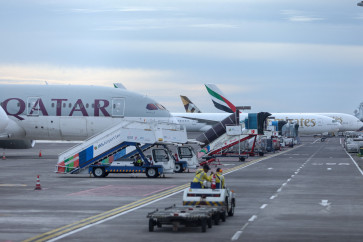Popular Reads
Top Results
Can't find what you're looking for?
View all search resultsPopular Reads
Top Results
Can't find what you're looking for?
View all search resultsNicolau Lobato, another Timor Leste specter
The specter of the Timor tragedy continues to haunt Indonesia, not just on the matter of impunity of past human rights violations, but now possibly also on the remain of Timor Leste independence hero Nicolau do Reis Lobato, buried in secret in Indonesia
Change text size
Gift Premium Articles
to Anyone
T
he specter of the Timor tragedy continues to haunt Indonesia, not just on the matter of impunity of past human rights violations, but now possibly also on the remain of Timor Leste independence hero Nicolau do Reis Lobato, buried in secret in Indonesia. Both issues are equally important for the relations of the two nations and can only be resolved with justice and honesty.
Timor Leste President Jos* Ramos-Horta used the commemoration of the 10th anniversary of the independence referendum last Sunday to remind the world that the two countries, Indonesia and Timor Leste, have decided to put the past behind them.
But he called for the remembrance of all who did not survive the conflict, including the widows and families of Indonesian soldiers who were killed and buried in Timor Leste.
As he expressed sorrow, he added the sympathetic gesture of inviting them to visit the graves.
In the same spirit, he also requested Indonesia to return the remains of the country's independence leader and second Fretelin president, Nicolau do Reis Lobato, who the Army buried in Indonesia.
Lobato was killed by the notorious Battalion 744 on New Year's Eve 1978. Reports at that time said the radical and charismatic leader was shot by the unit led by then Capt. Prabowo Subianto.
The publication of Lobato's death was very important to break the resistance's morale, and obviously it provided credit to those who captured him.
It's not clear where, when and how he was actually killed and brought to Indonesia.
The surviving first Fretelin president, Xavier do Amaral, said Lobato was shot twice by a Battalion 744 unit in Mindero, Same district, but was not sure which unit was responsible.
"Maybe the one led by Capt. Prabowo Subianto or another unit led by Capt. Yunus Yosfiah," he said.
More research is needed, in particular from Army sources and files. It is not uncommon for the Army to bring home an enemy commander, dead or alive, in order to show him to the world.
Photographs collected by an Australian observer suggest a triumphal expos* showing the dead body of Nicolau Lobato lying on the ground, and a number of Indonesian military officers - Gen. Benny Moerdani, Col. Dading Kalbuadi and Capt. Prabowo Subianto - standing behind it.
For the Timorese, Lobato's death was a great loss. Dili's international airport is named after him, and President Ramos-Horta called him "our greatest hero".
His death was the climax of an attempt to break the nationalist mass resistance that, coupled with a bad harvest, disease and hunger, resulted in hundreds of thousands of resistance members and civilians being killed during the 1975-1978 war.
Citing Ted Kennedy's "The dream shall never die ..", Ramos-Horta echoed his spirit to "keep the faith *and* the struggle going on".
The president's eloquent speech at the commemoration ceremony was an expos* of his political views and philosophy. The world has seen too much death and sorrow as a result of the Cold War, which promised but did not deliver a better life and greater justice.
The argument is to support his view that the path chosen by Timor Leste and Indonesia to resolve past issues through the Commission for Truth and Friendship (CTF) is final. To demand an international tribunal, he said, was "simplistic".
The absence of prosecutorial justice, he now said, did not foster impunity and violence. The Vietnam War and the US carpet-bombing in Cambodia did not lead to a culture of impunity in those countries as a result of the absence of international tribunals; Portugal and South Africa did not become less democratic and peaceful by not bringing the Salazar dictatorship and apartheid regimes to trial.
The argument seems to jump from a few big issues to other more complex questions. We know little what gains and lessons both those responsible and the victims have learned from the tragedies, except impunity for the authors and perpetrators and greater pain for the victims.
In fact many who were involved in atrocities in the then East Timor and Aceh have been promoted and pursued better careers.
It is as if to suggest that we should tolerate, say, a witch hunt within the Army, its intelligence service and elite corps, without pursuing prosecutorial justice - as in the case of the 1965 massacre of alleged communists - simply because it would bring greater problems without resulting in greater democracy and peace.
Without lessons that those involved could learn from, another generation would only understand little and risk repeating past wrongs.
Moreover, there seem to be contradictions between Ramos-Horta's stance that a firm "No" to an international tribunal was not the same as supporting impunity, on the one hand, and urging, on the other hand, Indonesia and Timor Leste to, in their own ways, end the impunity.
For no tribunal on gross human rights violations can be established without the full support of both countries.
To return the remains of Nicolau Lobato with honor would be a good opportunity for Indonesia to correct her past mistakes and respect a neighbor that became the victim of her past Cold War adventure. But neither this nor the CTF can replace Indonesia's responsibility to try those involved in so many atrocities in East Timor.
The writer is a journalist.










